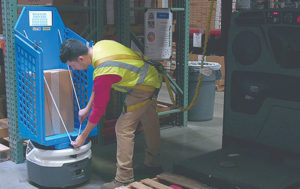
Ryder System is a Fortune 500 leader in commercial fleet management, dedicated transportation, and supply chain solutions. The company implemented automation in warehouses in the Miami, Dallas, and Chicago markets to serve three leading global consumer brands. After bringing together startup technologies and smart capabilities, Ryder optimized operations and improved customer service.
The warehouses feature advanced automation, such as state-of-the-art robotics, autonomous vehicles and drones, sensors and automatic identification tools, and wearable technology, including smart glasses and ring scanners. The warehouses are now flexible and scalable operations providing real-time visibility and a customer-centric experience.
Working together with a robotics provider (Fetch Robotics), Ryder deployed autonomous mobile robots that have made supply chain and logistics operations safer and more efficient. The robots are a flexible and scalable Cloud-based platform that minimizes strenuous manual labor and streamlines inventory processes.
Robotics produced a 25% increase in productivity and 20% operating savings by reducing travel time in the warehouse, which can account for 30% of an employee’s shift. Drones successfully scan pallet and locations in 20 minutes, compared to a manual scan, which took 90 minutes. A cycle count on the entire warehouse takes three hours instead of two days.
Sensors provide real-time asset location that increased productivity and cost savings by more than 25%. Smart glasses decreased the time it took to pick and scan inventory by five to seven seconds per item and improved efficiency by 33%.
“We are evaluating advanced technology and automation solutions that require minimum investment, but deliver maximum return,” says Steve Sensing, Ryder president of global supply chain solutions. “We focus on technologies that are mobile, flexible and scalable, so they can flex with changing demands. As Ryder customers continue to face increasing omni-channel fulfillment demands, rising consumer expectations, and a nationwide warehouse labor shortage, we will continue to innovate and automate the parts of the process that make sense.”

